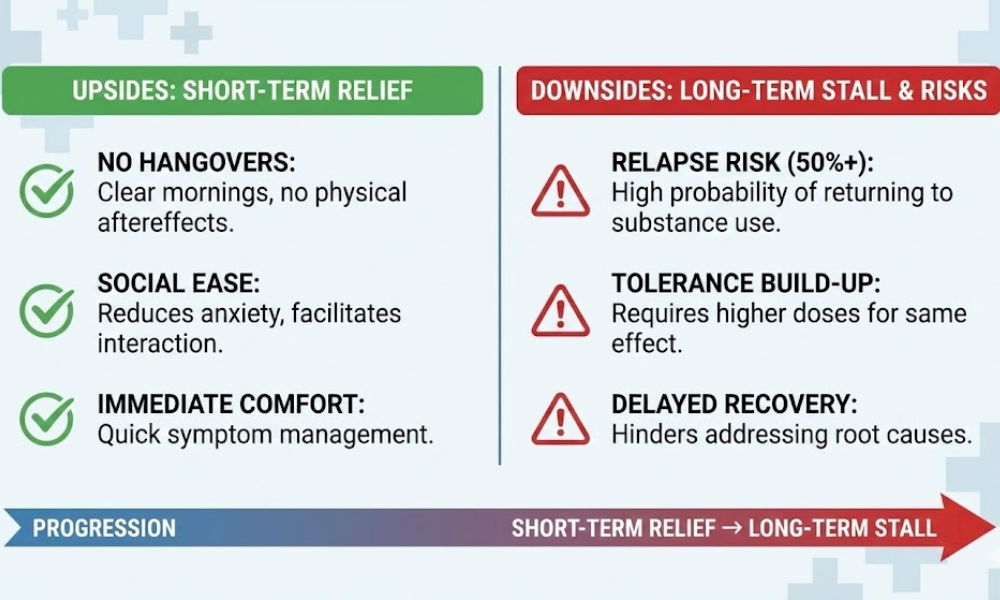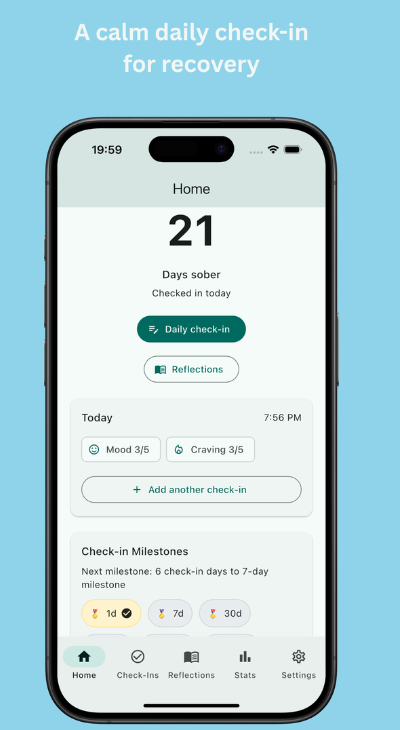“Cali sober” has gone from a quiet California trend to a global talking point in just a few years. Depending on who you ask, it’s either a smart harm‑reduction strategy or a slippery slope dressed up in wellness language. Somewhere in between the headlines and hashtags, real people are trying to figure out whether this lifestyle is helping or quietly keeping them stuck.
If you’re already questioning your relationship with alcohol and other substances, it’s worth zooming out beyond trends. For a full, medically reviewed roadmap of what safe detox and long‑term recovery actually look like, start with the 2026 Alcohol Detox & Recovery Guide from Live Rehab.
What does “Cali sober” really mean in 2026?
“Cali sober” usually means cutting out alcohol completely while still using cannabis, and sometimes psychedelics or other drugs, in a controlled way. People who identify as Cali sober see it as an upgrade from heavy drinking and traditional party culture, but it’s not the same as full sobriety and it isn’t a clinically defined recovery plan.
In 2026, the term has stretched even further. For some, it looks like switching nightly wine for edibles and vapes; for others, it’s a carefully curated mix of weed, microdosing, and “plant medicine” ceremonies in place of clubs and cocktails. The common thread is this: alcohol is out, but the idea of being altered isn’t. That might feel like relief at first, especially if alcohol has been causing obvious damage.
There’s also a cultural pull. Celebrities, wellness influencers, and sober‑curious communities talk openly about ditching booze while still using cannabis as a “less harmful” option. For people who aren’t ready to imagine never using anything again, Cali sober can sound like the perfect compromise: fewer hangovers, less shame, and a sense of still belonging socially.
But if you’ve crossed the line into alcohol use disorder or drug addiction at any point, the picture changes. In clinical terms, swapping one psychoactive substance for another does not count as remission from a substance use disorder and may keep the same circuits of dependence and compulsion alive. That doesn’t mean you’ve failed; it means you deserve a plan that looks at your whole history, body and brain – not just your favourite substance at the moment.
If reading this is bringing up questions about where you fall on that spectrum, it can help to see how detox and recovery actually unfold in the body. The 2026 Alcohol Detox & Recovery Guide breaks down withdrawal timelines, medical risks, and long‑term strategies in a way that goes far beyond any trend label: https://www.liverehab.com/alcohol-detox-recovery-the-complete-guide-2026/
Why are so many people choosing a Cali sober lifestyle?
Cali sober has caught on because it feels like a middle ground. People are tired of hangovers and alcohol‑related chaos, but full abstinence can feel extreme, lonely, or unrealistic at first. The idea of swapping nightly drinks for edibles, vapes, or occasional cannabis use promises less damage without giving up every altered state.
Many people choosing Cali sober are not necessarily trying to identify as “in recovery”; they’re trying to function better at work, sleep more, improve their mental health, and still say yes to social invitations without explaining why they don’t drink.
The broader sober‑curious movement has poured fuel on this. Alcohol‑free bars, zero‑proof cocktail menus, Dry January and Sober October challenges, and cannabis‑friendly wellness events make it easier than ever to opt out of alcohol without disappearing from your social life. When your feed is full of people talking about nervous system regulation and “mental clarity,” swapping wine for weed can sound like the logical next step.
There’s also a practical layer. Some people genuinely experience fewer negative short‑term effects with cannabis than with alcohol – less puking, fewer blackouts, fewer scary decisions. For them, Cali sober is a harm‑reduction move: the same parties, but a little less risk. The problem is that short‑term relief can hide deeper patterns of dependence, especially if alcohol has already crossed into addiction territory.
If you’re reading this and recognising yourself – drinking less, using more weed, still feeling stuck – it may be time to look at what a complete recovery path actually involves instead of just swapping substances. The 2026 Alcohol Detox & Recovery Guide walks you through detox, withdrawal timelines, medical risks, and what long‑term recovery looks like beyond trends or labels.
Is it actually safe for people in recovery?
For people with a history of substance use disorder, most addiction professionals do not consider this approach a safe long-term recovery strategy. It reduces alcohol intake but often introduces cross-addiction risks, tolerance buildup with cannabis, and a higher chance of relapse to heavier substances.
While cannabis may feel less destructive than alcohol, it still engages the brain’s reward pathways in ways that can maintain compulsive patterns. What starts as “just weed to unwind” can recreate the same cycles of dependence, especially if your brain chemistry has already adapted to regular intoxication. Mental health risks like increased anxiety, paranoia, or amotivation often emerge over time, particularly for those prone to substance escalation.
The data backs this caution. Studies show substitution strategies like this lead to poorer outcomes in formal recovery programs compared to abstinence-based paths, with relapse rates climbing when one substance props up another. It’s not about judgment – it’s about protecting the hard-won clarity that comes from breaking those circuits entirely.
If you’re weighing whether your history puts you at risk for withdrawal complications or cross-addiction, the medical realities of detox matter. Our 2026 Alcohol Detox & Recovery Guide details timelines, symptoms, and when professional oversight is non-negotiable: https://www.liverehab.com/alcohol-detox-recovery-the-complete-guide-2026/.
What are the pros and cons of a California sober lifestyle?
This approach offers clear short-term upsides for some – fewer alcohol-related harms like hangovers, liver strain, and blackouts—while letting people stay socially active without total isolation. But it introduces its own risks, often stalling deeper recovery work and maintaining a substance-centered identity.
As the Wall Street Journal noted in their coverage of the trend, “California sober” appeals because it feels realistic: ditching booze but keeping cannabis as a “safer” unwind tool (https://www.wsj.com/articles/california-sober-the-new-sober-11612345678). That harm reduction can buy time and reduce immediate damage, especially for those not in full-blown addiction. The downside? Cannabis tolerance builds quickly, leading to higher use over time, plus potential mental fog, dependency, and the slippery slope back to alcohol when weed stops delivering.
Here’s how it breaks down:
| Aspect | Potential Upside | Key Downside |
|---|---|---|
| Physical Health | Less liver damage, fewer hangovers | Cannabis lung/heart strain, appetite issues |
| Mental Health | Short-term anxiety relief from alcohol | Paranoia, amotivation, stalled emotional growth |
| Social Life | Easier “no thanks” to drinks | Still orbiting drug culture, not fully free |
| Long-term Recovery | Feels like progress initially | High relapse risk (50%+ vs. abstinence paths) |
If you’re weighing whether the trade-offs work for you, a structured path beyond substitution often delivers better clarity and stability long-term.

Is Cali sober right for your personal recovery goals?
Not if you’ve experienced loss of control with alcohol, failed moderation attempts, or patterns of escalating use with any substance. This approach works best as a short-term experiment for those without addiction history, but for deeper dependence, it often delays the real work of breaking compulsive cycles.
Ask yourself these questions honestly:
- Have you hidden your drinking or cannabis use from family or colleagues?
- Do you need substances to unwind, sleep, or handle social anxiety?
- Have you tried—and failed—to set firm limits on alcohol or weed multiple times?
- Does “just one more” turn into a pattern, even with your “safer” choice?
- Are you using to numb emotions rather than face them?
- Has your substance of choice started affecting work, relationships, or health?
If three or more resonate, you’re likely beyond harm reduction territory. The good news: recognizing this is the first step toward a structured path that actually rewires those patterns without shame or isolation.
A complete home-based recovery program can meet you exactly where you are and guide the transition at your pace: https://www.liverehab.com/product.
How does California sober compare with full sobriety and guided home recovery?
Each path has different rules, support, and outcomes. Here’s how they stack up:
| Path | Substance Rules | Support Level | Short-term Experience | Long-term Outcomes |
|---|---|---|---|---|
| California sober | No alcohol, cannabis/psychedelics OK | Self-guided | Some relief from booze harms, but ongoing fog | Higher relapse risk, stalled growth |
| White-knuckle abstinence | No substances at all | Minimal/none | Intense cravings, isolation | Often unsustainable without structure |
| Guided home recovery | Full abstinence, medical detox + therapy | Structured digital program + community | Supported detox, steady progress | Proven for lasting change at home |
The third option stands out for professionals needing privacy and results without disruption. It combines medical detox protocols (timelines, meds, monitoring) with behavioral tools that address root causes – far beyond swapping one substance for another.

Explore the full home recovery program here: https://www.liverehab.com/product
How can you move from California sober to a more stable recovery?
Start by clarifying your “why” beyond just alcohol: journal what full freedom would unlock in your work, relationships, sleep, and energy. Then set a 30-90 day cannabis-free experiment or taper, replace with non-substance coping (sleep hygiene, anxiety tools, social planning), and build accountability through a partner or structured program.
Here’s a simple sequence that works:
- Day 1-7: Track triggers and set your quit/taper date – no more “last night.”
- Week 2-4: Learn replacement skills (breathwork, movement, boundary-setting).
- Month 2+: Address PAWS symptoms like cravings and mood swings with proven tools.
- Ongoing: Weekly check-ins to stay on track without isolation.
This isn’t white-knuckling; it’s a deliberate transition that breaks dependence cycles safely. Compare all home recovery options and pricing to find your fit: https://www.liverehab.com/pricing

Built for High-Performing Professionals
Liverehab’s Alcohol Recovery Home Detox is specifically designed for executives and professionals who need a structured, medically-supervised detox that fits around real work demands – not the other way around.
When should you seek professional help instead of relying on California sober?
Seek help if you’re experiencing withdrawal symptoms from alcohol (shakes, anxiety, insomnia), daily cannabis dependence, failed cutback attempts, mental health crashes, or fallout in relationships/work. These are non-negotiable red flags signaling your brain needs structured support, not more self-experimentation.
Clear thresholds include:
- Needing substances daily to function or cope
- Hiding use or breaking your own rules repeatedly
- Withdrawal hitting when you try to pause (even cannabis)
- Cravings overriding work, family, or health priorities
- Co-occurring depression, anxiety, or paranoia worsening
Online home-based recovery delivers this discreetly – no clinics, no stigma.
FAQs about Cali sober and recovery
No – AA and most clinical programs define sobriety as complete abstinence from all mind-altering substances, including cannabis. Substitution keeps dependence pathways active and often leads to exclusion from meetings.
Possibly for those without addiction history seeking alcohol reduction, but not for substance use disorder. Cross-addiction risks and relapse rates (50%+) make it unreliable long-term.
Not always, but data shows significantly higher relapse to alcohol/other drugs vs. full abstinence paths. It maintains reward-seeking behavior, complicating brain rewiring.
Give it 30-90 days max with strict tracking. If dependence patterns emerge (daily need, tolerance, failed cutbacks), pivot to structured recovery to avoid escalation.
Yes – programs like Live Rehab meet you where you are with tapering guidance, medical detox protocols, and transition support. No judgment, just a clear path forward.
Low-moderate risk cases use supervised detox protocols with online programs and escalation plans. High-risk needs inpatient and medication assessments first.
If California sober feels more like a stall than freedom, you’ve got options that deliver real clarity without disruption. Start with our home recovery packages: https://www.liverehab.com/product


